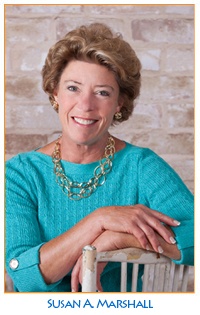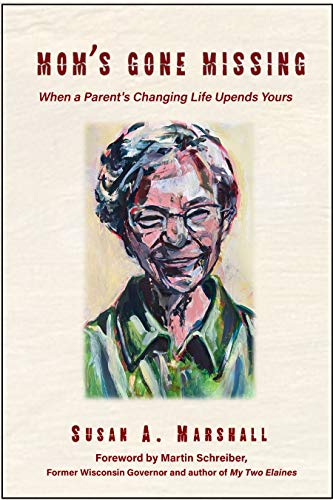
In her new book, Mom’s Gone Missing, When a Parent’s Changing Life Upends Yours, authorSusan A. Marshall shares the ups and downs of caring for her parents as each faded away to the ravages of Alzheimer’s and Dementia.
Madison, WI. There’s an old adage that says a journey of a thousand miles begins with a single step, but sometimes that starting line is not one you could ever imagine.
The complicated, often frustrating journey that Susan A. Marshall took began and ended with her caring for both parents before they passed away.
Marshall is a business leader (founder of Backbone Institute. https://backboneinstitute.com/) and author of the newly released book, Mom’s Gone Missing, a deeply moving story about her experiences as the major personal caregiver for her parents.
Her memoir is not a how-to book but rather a daughter’s experiences with her father’s decades-long journey with Alzheimer’s and her mother’s lightning fast decline due to Dementia.
Marshall’s book describes what happens to family members and what she’d like others to know if they too find a loved one ‘missing’ due to degenerative diseases with no cure.

In Her Own Words
Marshall’s book starts with a call in 2016, on the first Monday of the year, from her sibling in Colorado (Susan is located in Wisconsin) and her mother was living in Arizona. Her sibling said, “Mom’s Gone Missing.”
In her book with the name that echoes that scary time when her mother was missing in another state, Marshall talks about what’s it like to sit down and write about it.
In an excerpt in the Preface of her book, she explains.
“Writing about family experiences is always fraught with the dangers of misinterpretation, colliding viewpoints, and hurt feelings. With this danger at the forefront of my mind, I set out to bring the experience of Dad’s long journey through Alzheimer’s disease, Mom’s experience as his lifelong partner and caretaker, and Mom’s rapid decline and death surprisingly soon after Dad’s passing. My sole and sincere reason in writing this is to offer information and encouragement to anyone who is now or will one day be confronting the declining health and ultimate passing of a parent or beloved family member.”
After her mom’s cognitive and emotional state rapidly deteriorated, Marshall took on the arduous role of caregiver which initially meant clearing away the physical remnants of her mom’s life in Arizona, then physically moving her home to Wisconsin.
After the doors of the plane shut, and Susan and her mom headed down the runway to living with a new reality, her mother’s final chapter without memories, Susan writes, “I felt suddenly tired to my bones as a wash of emotion threatened to push tears from my eyes and a sob from my chest. I would have time to deal with my own feelings about all this later. We still had a long way to go before we pulled into my driveway.”
Family Caregiving – On Many People’s Minds
Marshall’s story is poignant, true and encouraging for those who may walk in her shoes someday. In her book she offers ideas for getting through difficult times …her motto was (and is) …”I can only do today.”
Research has found that family caregivers of people with Dementia experience more burden and are at greater risk of developing depression than caregivers of people with a chronic illness. Dementia symptoms include diminished reasoning, memory, social and language skills that can alter a person’s ability to function in daily life. Alzheimer’s disease is the most common form of advanced dementia.
Alzheimer’s is a chronic, progressive, fatal disease and caregiving at home for someone with the disease is fraught with many challenges but also rewards.
Alzheimer’s Associations encourage caregivers to reach out for assistance and take care of themselves. Because of the progressive, debilitating nature of the disease and the extended length of the caregiving process, multiple services are needed to provide comprehensive support and education to dementia caregivers.
Candid sharing of experiences like those in Marshall’s book shine a light on what it’s like to care for parents with Alzheimer’s and Dementia. Her experiences benefit those who may feel alone in their own caregiving role. They also gain remarkable insight from Marshall’s lessons learned should they find themselves walking in the same shoes someday.
Marshall’s wisdom and words help decrease stress for family caregivers and may be even more important in years to come as people continue to live longer with incurable diseases.
Former Wisconsin Governor Weighs In
The Foreword to Marshall’s book was written by Martin Schreiber, Former Wisconsin Governor, and author of My Two Elaines, which describes his journey caring for his wife who struggled with Alzheimer’s.
Excerpt from Governor Schreiber’s Foreword:
“Anyone who is about to journey as a caregiver or anyone who wants to understand what caregiving is truly like must read about the experiences of a caregiving daughter, Susan A. Marshall. She openly and candidly shares with us her excruciating journey as a caregiver for both her mom and dad.
“It is unfortunate we do not have a medicine to cure the loved one who is ill, to give the caregiver the necessary patience, understanding, acceptance, humor, and perspective that are so critically needed at this time. While no medicines like that are available currently, we do have Mom’s Gone Missing. It will not cure or take away the pain but it will help the caregiver survive and maybe even thrive.”
One of the things that can help caregivers survive is having a strong sense of staying focused while staying the course.
For Marshall, it’s probably fair to say her company’s motto -“Never Grow a Wishbone Where a Backbone Ought to Be,” offered a powerful source of strength.
We appreciate the authentic, sharing about a topic so prevalent, yet seldom talked about. Susan’s direct and kind message is a model and message we can all learn from. Thank you for your great work.
To learn more about Susan A. Marshall and her work on other valuable topics please connect to her website with this link. https://backboneinstitute.com/







